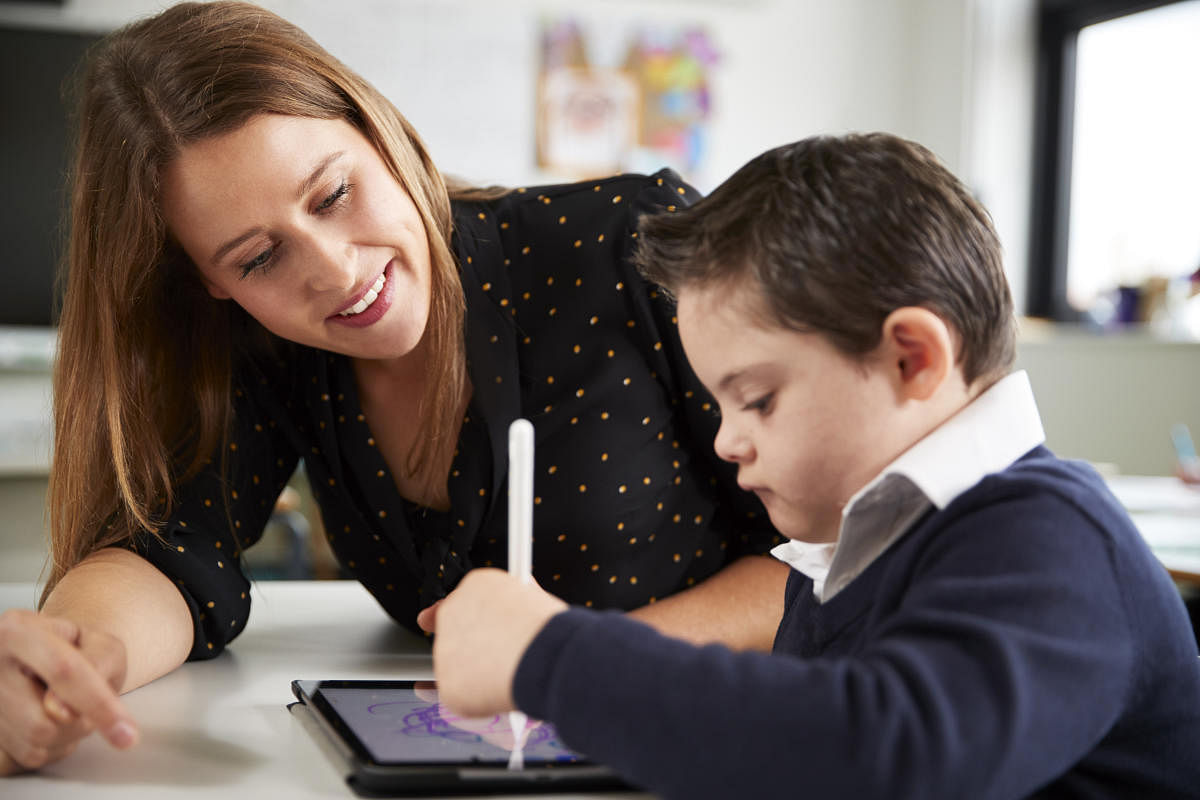
Harshita Mittal, an 18-year-old girl with visual and hearing impairments, has lost interest in studies ever since her school was closed in March due to Covid-19.
Though online sessions have begun recently, it is tough for Harshita to follow the instructions, as listening with hearing aids is difficult.
"As there has been a big gap, I am finding it hard to convince her to study or do speech therapy exercises and she is finding it difficult to concentrate. Also, online sessions aren't being conducted regularly which further hampers learning," says Pooja Mittal, Harshita's mother.
With the switch to online learning, most parents are finding it difficult to deliver remote instructions to their children. However, the transition from being a caregiver to an educator has been the toughest for parents of children with special needs.
Rudraksh Mishra, a nine-year-old child with multiple disabilities, learns through touch. With this crucial element missing in online classes, his learning has taken a beating.
"Weekly once individual sessions are conducted wherein first I learn something and then teach him the same. However, in most cases it is not as effective as in schools as children tend to listen and cooperate more with teachers than with parents," says Geetanjali, Rudraksh's mother.
Biggest hurdle
For many parents, the biggest hurdle to teach children with special needs is lack of access to teaching and learning materials. Also, as such children cannot express themselves, the stress tends to manifest into aggression which makes it difficult for parents to teach them.
Vijay Das, father of six-year-old Shriya, who is visually impaired and deaf, says, "In school, such children are mainly taught to live independently, they are taught to eat on their own, use the washroom etc. Ever since her school closed, not only has her learning been affected but her daily routine has been disturbed too."
According to a 2019 report by UNESCO and the Tata Institute of Social Sciences, more than one in four children with disabilities between ages 5 and 19 in India have never attended any educational institution, while three-fourths of five-year-olds with disabilities are not in school.
Though India has seen an improvement in enrolment rates of children with special needs, the closure of schools will likely lead to an increase in dropout rates in the coming days.
"The digital divide, lack of accessible educational materials, and necessary tools have restricted the implementation of e-education for special children," says Arman Ali, executive director of National Centre for Promotion of Employment for Disabled People (NCPEDP).
According to surveys conducted (from March to June) by Swabhiman and Disability Legislation Unit of Eastern India of NCPEDP, only 56.5% of children with special needs were attending online classes, though irregularly. Around 77% of students said they would not be able to cope and would fall behind in learning due to their inability to access distance learning methods.
"If adequate measures are not taken urgently, students with special needs are likely to suffer irrecoverable losses in their quest for education and a life of dignity,” says Sruti Mohapatra, executive director of Swabhiman, a community-based organisation.
Bridging the gap
While there is uncertainty on when schools will reopen, accessible, assistive and affordable learning tools can help bridge the learning gap.
To prevent reversal of education gains, there is an urgent need for the government to mobilise resources to cater to the requirements of children with special needs. The government ought to give thrust and allot required funds for the development of alternate course materials for such children, and take into account the needs and challenges of all children in its Pragyata guidelines for online education.
"The first requisite is reading material in alternate formats which must cater to different disabilities," Sruti says.
“We have to keep all options open for them, those who require a scribe must have scribes available to them, those who require assistance on braille learning material should have access to it and those who require sign language interpreters should have access to them. Steps should be taken to ensure that nobody is left behind,” says Arman.
Along with providing hardware support like computers/tabs to disabled students and exploring other teaching mediums such as television and community radio, it is crucial to empower parents so that they are able to learn new technology and support their children, according to Sruti.
Additionally, parents feel, the services of more educators, therapists, trainers and counsellors have to be leveraged to assist such children.
Greater awareness about the challenges faced by children with special needs ought to be created to encourage more people to work towards making education inclusive, and companies to come up with more accessible and assistive technology.